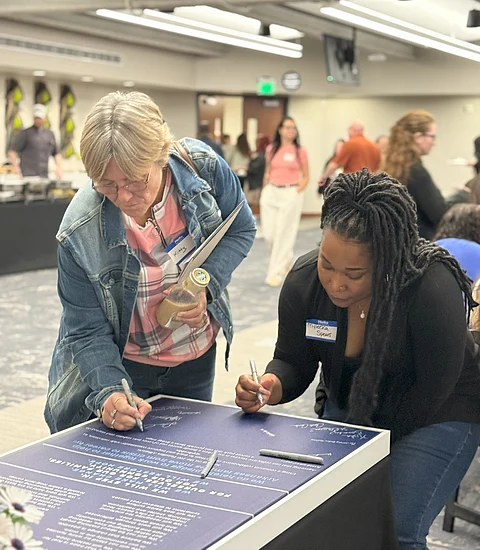
- Home
- Topic Areas
- Newsletter
- Podcast
- 100 Families Initiative
- About
- Connect
- Restore Hope

In Ingham County, Michigan, a powerful movement is taking root—one grounded in shared compassion, trauma-informed care, and the belief that when a community comes together, real transformation is possible.
At the heart of this effort is the monthly 100 Families Initiative Alliance Meeting, where a diverse coalition of nonprofits, churches, agencies, and community leaders gather with one shared mission: to help families move from crisis to stability—and ultimately, to thriving.
This month’s gathering showcased the strength of that alliance. From transportation services for medically fragile children to housing support, job placement, and GED programs, every organization present brought their piece of the solution.
The community's data spoke for itself:
58 families served, impacting 134 children
16 families moved from crisis to career
200% increase in housing stability
113% increase in employment
95% job retention rate
33 families supported through crisis prevention
The event’s featured panel explored the lasting effects of trauma—and how healing begins with empathy.
Patient Baraka, as a refugee from the Congo and a clinical social worker, emphasized the importance of culturally competent care for displaced individuals.
"The bottom line is to understand the person who has trauma from a place of love and from a place of support, from a place of, you know, comfort, from a place of safety, because that's where the treatment starts."
"Our trauma has to be addressed. And this time we need to train more for a peaceful but a culture in the traditional, perspective to understand those individual and those kind and be able to support them in healthy way."
Aaron Jones, correctional programs coordinator, shared the impact of childhood trauma on those entering the justice system. Many individuals entering the prison system have experienced trauma from a young age, often growing up in abusive or neglectful environments. They've faced abandonment, exploitation, and deep-rooted family dysfunction. These early experiences lead to high-risk thoughts and behaviors, which continue in and out of prison, reinforcing negative beliefs about themselves and the world.
"They come in with a lot of high risk beliefs, a lot of high risk thoughts, and it causes them to operate within the prison system with those same high risk thoughts and high risk beliefs. And it really is it becomes a challenge for them to learn different ways of coping, different, processes, different, coping skills and coping mechanisms that they, that they really need in order to help them move forward."
Mary Corrigan is a mental health expert who has worked with foster children for about 30 years, long enough to witness the deep roots of generational trauma. She reflects on how many of her patients never had the opportunity to dream about their future, while others—despite good intentions—found themselves caught in cycles of hardship, from incarceration to foster care involvement and ongoing struggle. Even with childhood hopes, trauma often persisted, making it difficult to break free and move forward.
"So a large part of what I believe we do is try to give other ways to be with somebody while they're going through scary situations in this time. I like 'walking beside' as opposed to 'you're on your own' or 'you have to.'"
Ricarda “Sunshine” Riddle, advocate and trauma survivor, emphasized that trauma is a shared human experience, often unrecognized in ourselves and others. She described leadership as a process of self-awareness, accountability, and emotional regulation—being honest about one's reactions and striving to treat others in ways they would want to be treated.
“The leadership piece for me looks like being honest with myself, leading myself like leading my systems every day. So that I can put out what I'm also like to receive."
She believes that this kind of personal honesty not only fosters growth within, but also invites it in others.
"And the more that I do that, and the more that I'm honest about that with other people, and we invite that into just regular conversation. The more other folks are being introspective and finding out those answers too. So, I would just say that it comes from sharing knowledge. It comes from, holding yourself accountable, knowing that you don't always get it right."
The conversations in Ingham County make one thing clear: healing begins when people feel seen, heard, and supported. Through intentional collaboration, trauma-informed care, and a shared commitment to walking beside families—not ahead or behind—the 100 Families Initiative is building trust.
From housing to health, from justice to generational change, the partners in this alliance are proving that no single organization can solve complex challenges alone—but together, they can change the story.
Faith leaders, re-entry specialists, housing advocates, therapists, and everyday heroes united under one truth: When a community leads with love, listens deeply, and walks alongside those in crisis, healing isn’t just possible—it’s already happening.
Smart Justice is a magazine, podcast, and continuing news coverage from the nonprofit Restore Hope and covers the pursuit of better outcomes on justice system-related issues, such as child welfare, incarceration, and juvenile justice. Our coverage is solutions-oriented, focusing on the innovative ways in which communities are solving issues and the lessons that have been learned as a result of successes and challenges.
The podcast is available on all major podcasting platforms.
Subscribe to the Smart Justice newsletter.
